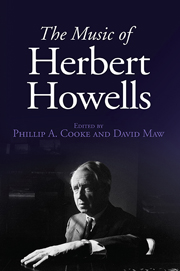Book contents
- Frontmatter
- Dedication
- Contents
- List of Illustrations
- List of Musical Examples
- List of Tables
- List of Contributors
- Foreword
- Acknowledgements
- Miscellaneous Frontmatter
- Introduction: Paradox of an Establishment Composer
- PART I Howells the Stylist
- PART II Howells the Vocal Composer
- PART III Howells the Instrumental Composer
- PART IV Howells the Modern
- PART V Howells in Mourning
- 13 In modo elegiaco: Howells and the Sarabande
- 14 On Hermeneutics in Howells: Some Th oughts on Interpreting His Cello Concerto
- 15 Musical Cenotaph: Howells's Hymnus paradisi and Sites of Mourning
- Appendix: Catalogue of the Works of Herbert Howells
- Bibliography
- Index of Works
- General Index
15 - Musical Cenotaph: Howells's Hymnus paradisi and Sites of Mourning
from PART V - Howells in Mourning
Published online by Cambridge University Press: 05 December 2013
- Frontmatter
- Dedication
- Contents
- List of Illustrations
- List of Musical Examples
- List of Tables
- List of Contributors
- Foreword
- Acknowledgements
- Miscellaneous Frontmatter
- Introduction: Paradox of an Establishment Composer
- PART I Howells the Stylist
- PART II Howells the Vocal Composer
- PART III Howells the Instrumental Composer
- PART IV Howells the Modern
- PART V Howells in Mourning
- 13 In modo elegiaco: Howells and the Sarabande
- 14 On Hermeneutics in Howells: Some Th oughts on Interpreting His Cello Concerto
- 15 Musical Cenotaph: Howells's Hymnus paradisi and Sites of Mourning
- Appendix: Catalogue of the Works of Herbert Howells
- Bibliography
- Index of Works
- General Index
Summary
To the memory of Mark William Highleyman
‘What humanity can endure and suffer is beyond belief’.
Sir Edwin Lutyens, letter of 12 July 1917An horrible story: one that causes sickening knots of dread to tighten in the pit of any loving parent's stomach. The events unfold simply, inexorably, as if the chill hand of the Erlkönig guided the tragedy. A family is on holiday in Gloucestershire when the youngest child, a bright, resolute, and charming little boy, falls ill. A local doctor is summoned, makes an accurate diagnosis and urges the family to return to London as quickly as possible. On the ride to the train station and on the train hurtling through the darkening countryside, the gasping child, held by his powerless father, struggles to breathe, turning blue and black from lack of oxygen, a sure sign of bulbar poliomyelitis. On arrival in London, an ambulance rushes the little boy to a nursing home; as the doctors debate about what to do – an iron lung, perhaps? – the child proves their irrelevance by dying. The boy, named Michael, left behind a father immured in a grief that time did not assuage; a mother whose feelings were doubtless keen but went virtually unnoticed; and an older sister whose secondary place in her father's affections would be felt again and ever again in the decades to come.
- Type
- Chapter
- Information
- The Music of Herbert Howells , pp. 285 - 308Publisher: Boydell & BrewerPrint publication year: 2013



